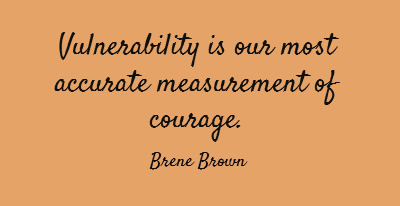I’m writing this on Sunday, but plan on posting it Monday, so this information will be a day late. Kristina and I are having a blast on our mother/daughter trip to Ireland. We landed in Shannon at 6:00 AM, then drove the the stunning Cliffs of Moher. After that, We drove to the Bunratty Castle, scoured over every nook and cranny there, then went to our hotel in Killarney to crash for a while. We had High Tea in the hotel and then explored the town, winding up in a favorite pub of locals, The Laurels. I had a Black and Tan and Kristina had a Guinness. Guinness here tastes completely different from Guinness stateside. It’s very smooth with chocolate and coffee tones. Now, we’re sitting by a fire working on our blogs and vlogs, enjoying our second pint. It’ll be an early night because we plan on driving the Ring of Kerry, then to our hotel in Cork. I’ll try to post pictures and videos when I get back.
Here’s Part Two of Erik’s session about vulnerability. Notice I included the end of Part Two for your reference. It’ll segue better. Enjoy!
Erik: Well, let’s say, in general, you’re a healthy person. In general, you have healthy thoughts. Define that however you want. I’m just talking about not having a ton of crazy. Just a little crazy. And you go to share your vulnerability with someone. That judgment that might come from that person can be completely flushed out and managed with the right conversation and that requires vulnerability. You can say, “I’m really fucking nervous about telling you this. I know that I’d feel better if somebody else knew this about me. I’d like to know that if I shared something with you, what would you do with it? Do you know how to keep a secret? I’m going to identify this as something very important to me that needs to stay between us, or I’m just telling you it’s important; I don’t care who you tell; I just want you to know.” You know, whatever your boundaries are. Be able to have good, clear communication when you’re being vulnerable because that shit matters. “Will you listen? Will you keep a secret? Will you tell me that I’m being heard, and will you hang in there until you can understand the way I see it?” Most people jump to conclusions.
Me: That’s true, and if you don’t have anybody in your life that you can trust with that kind of thing—
Erik: Show me the Internet.
Jamie laughs.
Me: Or—
(Long pause)
Me: Lukas is passing me Post-it notes.
Erik: Love notes!
Me: No, they’re not love notes. It says, “Making Pappardelle tonight. Need groceries.” All right, you could have waited. Okay, so I guess you could go to a therapist.
Erik: Yes. Life coach, counselor, therapist, whoever, and know that when you pick somebody like that, they really need to resonate with you. If you go in and are like, “Ew, I don’t know about them. They’re really bossy. They’re labeling me with all this shit, and they’re trying to…” Fucking walk out. You’re hiring them, dude. You don’t have to serve them; you’re hiring them. Fucking walk out and pick a few more names and show up at their office and sit down and go, “How can you help me,” and when you find a good match, boom, you’re in.
Me: What if they can’t afford therapy?
Erik: Oh, Mom, there’s a lot of free therapy out there: social services—
Me: Churches.
Erik: Churches, community support groups. You can go to your library and get online and start researching it. Start asking. “Hey, where do you go? Do they offer this or that? Group therapy?” Group therapy is also good.
Me: What about another example of vulnerability, not a dark secret but sharing that you really love someone and they don’t know it, even if it’s your Aunt Mary, and you always loved her, not romantically, but have such affection for her, and you kind of want her to know that, but you’re afraid. People are afraid to express affection.
Erik: Yeah, because affection is seen as weakness.
Me: Why is that? Why? I don’t get it.
Erik: Because in the past, people have used those sweet emotions to manipulate to get what they want and to bruise people or bully them.
Me: Okay.
Erik: And that’s old school thinking, everyone. Old school thinking.
Jamie chuckles.
Erik: Nowadays, the value of showing love or affection is high up on the scale. It’s no longer seen as a weak trait for men—and for women—to have. So if you have trouble expressing to someone that you have affection or deep love for them—oh, you wanted an example. Like what kind of example?
Me: Any kind. You think of something. It can be romantic affection or a platonic one.
Erik: How about if you’re coming out of the closet for the first time, and you want to tell a same sex partner that you love them? You don’t get to see very many examples of that in entertainment or on TV. A lot of times, how we handle our relationships is modeled after what we see in our parents or on TV. We kind of base it on that. So there’s a lot of hesitation in coming out and really sharing with the same sex person because acceptance is fucking huge for this. It’s huge!
Me: Yeah.
Erik: It’s the same as with the example before—identify things before you speak out, and make sure it’s in the right place and not in line at the grocery store.
Me: Oh, yeah.
Erik: Or not when you’re driving. Really set the atmosphere for it. I’m not saying pull out the fucking candles and shit like that, but have it to where you both can be eye-to-eye. If you know you’re a nervous sharer, why don’t you go for a walk so you can get some of that nervous energy out of you?
Me: And you don’t have to face the person.
Erik: Yeah, you don’t have to face them. That’s right, Mom. You can be like shoulder-to-shoulder, equals talking about it.
Me: But being truly vulnerable means facing them and making eye contact. So this is like “beginner’s vulnerability.”
Jamie (laughing): Beginner’s vulnerability! Why? Why is eye contact vulnerable?
Me: Well, it is to a lot of people. It’s almost like a threat. I think it’s instinctual, and your eyes are the windows to the soul. They’re going to see your soul and suck it out through your eyeballs!
Jamie laughs.
Me: I don’t know.
Erik: I like that. We’re just looking at emotional vulnerability because we’re definitely wired to be emotional beings. Yeah, I like it. You can call it the beginner’s step in vulnerability. Nervous sharer? Go shoulder-to-shoulder and take a walk, but identify those factors that are creating hesitation before you fucking share. So if it’s all about acceptance and you’re telling the person you love, “Listen, I want to say something to you, but I’m so nervous. I’m worried that you won’t see me in the same way anymore. I’m concerned that you won’t accept me for who I really am because maybe I don’t know how to define myself or that I’m not going to say this right or that I might fuck up.” Just say all those things about the hesitation before you share. Then, once you go to share, the person knows where you’re coming from. Your vulnerability then has roots. They know where it’s coming from. It’s not all of a sudden dropping from the fucking sky! That’s when people are like, “What? No way! Haha!”
Me: Oh, no! That would be terrible! What about a sibling?
Erik: No, no, no!
Me: Oh, you’re not finished with that one?
Erik: No, because I think we also need to talk about the flipside when you were saying the comfortability—
Jamie: Is that a word?
Nope.
Erik: –where people run and tease. Just knowing that whatever you share, if it’s the truth and it’s honest about you, it’s going to serve and protect who you are, your authentic self. I don’t fucking care if this person grapevines it to somebody else and twists the story and goes on and on—
I would!
Erik: –because your acceptance in life of who you are should not be based on how other people view you.
Me: True!
Erik: That’s the big thing about vulnerability. You were sharing with that individual or that group at that time because you needed to be authentic to who you are. What ripples out from there is not under your control, and it’s not your responsibility, but if it comes back to you, you can choose to handle it in the best way you can. It doesn’t change who you are. Okay, what was your sibling question?
Me: What about a sibling telling another sibling that they love them? That’s always hard.
(Pause)
Me: Why is it so hard? Sibling rivalry, I guess?
Erik: Yes, and it could be the way the family was raised where they’re not supposed to talk about their feelings. You’re supposed to tough it out because that’s the good ol’ American way! Tough it out!
Me: That’s right!
Erik: And so it boils down—and usually it happens when a whole bunch of shit has gone down, and you’re like, “Fuck! You’re about to die. Guess what, dude? I love you.” Competition, rivalry, comparison, who is better, who is closer, who got what, and that’s all what we just talked about. It’s because we’re raised in an environment to compare others to ourselves to find out who we are. If we got rid of all that—
Jamie (plucking at her sweater): He’s pretending to pull things off of him.
Erik: If we got rid of all that, what people say about us, then we’d have to sit down and think about who we really are without all of it. Then we’d get to the real authentic self. Then, when you’re being vulnerable, sharing with someone you think might bruise or injure you—that’s what vulnerability is—you just become more powerful, more in your shoes, stronger, more real.
Me: Yeah, that sounds like a nice thing.
Vulnerability: The path to the authentic you.
Erik: It is a nice thing. I really like it.
Me: Well, I think that’s a good place to close unless you have anything else to add.
Erik: Ding-a-ling!
Me: Ding-a-ling? All right.
His “ding” with a Christmas spin to it.
Jamie: He’s singing the Christmas tune with the bells.
She tries to hum it, but it’s sad, really.
We close with goodbyes and holiday wishes.

The Cliffs of Moher

Bunratty Castle



